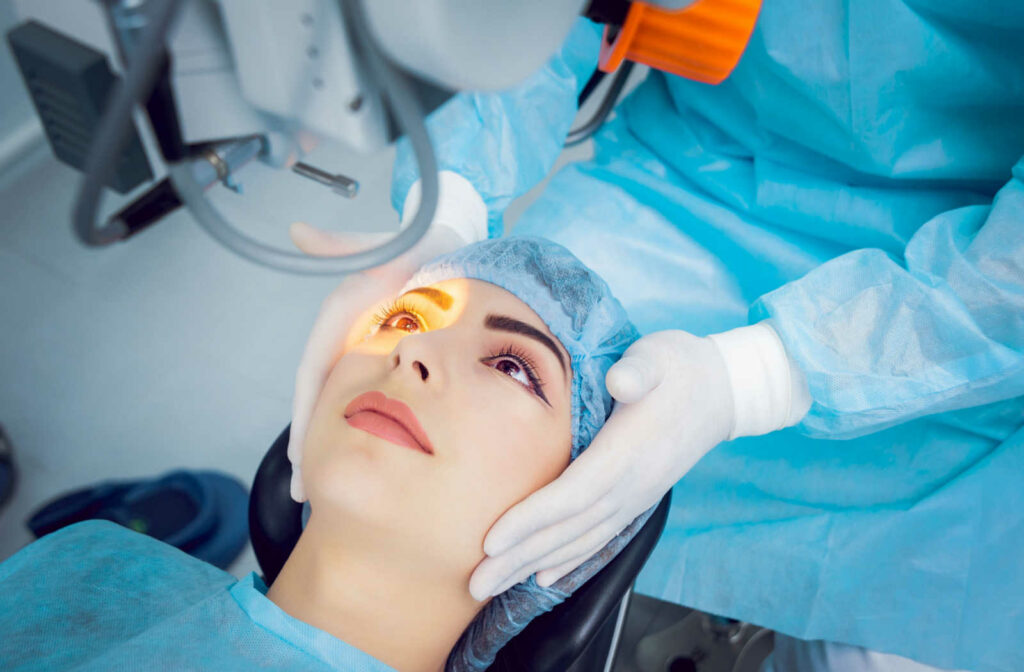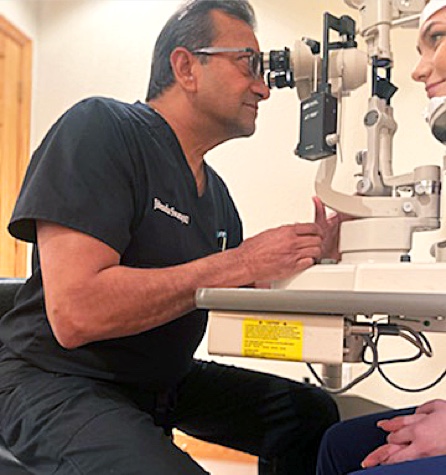Cataracts are a slow-developing form of eye disease that can affect your daily life in the later stages. Early diagnosis at an eye exam can help manage the condition and have you seeing clearly once again.
But what does post-op cataract surgery care look like? Let’s look at what a cataract is, how it develops, and the post-surgery outlook.
What Is a Cataract?
A cataract occurs when the normally clear lens of your eye becomes clouded. Cataracts eventually cause your vision to become cloudy and obscured in the affected eye. Cataracts can be the reason why sharp images become blurred, discolored, dull, or distorted.
As a result, cataracts can make it difficult to perform some daily activities such as reading or driving a vehicle.
Some common signs and symptoms of cataracts may include:
- Increased difficulty with vision at night
- Sensitivity to light and glare
- Seeing halos around lights
- Frequent changes in glasses or contact lens prescriptions
- Double vision in a single eye
Cataracts are a naturally occurring phenomenon that develops slowly. There are other risk factors associated with cataracts that include:
- Heavy alcohol use
- High blood pressure
- Smoking
- Hereditary
- Sun exposure
- Previous eye injuries
When cataracts begin to affect your daily life and prevent you from going about your daily activities, such as reading or driving—surgery is the only option to remove them.
Cataract Surgery
Cataract surgery involves replacing the natural cloudy lens with a new artificial intraocular (IOL) lens to restore your vision. Before the surgery, your doctor will take all the necessary measurements to determine the focusing power of your new artificial lens.
Most cataract surgeries use a procedure called phacoemulsification. This procedure uses a high-frequency ultrasound device to break up the cloudy lens into small pieces. Your surgeon will then be able to remove the cataract particles from your eyes with gentle suction.
After removing these small pieces of the cloudy lens, the artificial IOL lens will be placed.

Cataract Surgery Post-Op Care
Post-op care is an essential aspect of cataract surgery. After your surgery, your vision improves within the first few days. During this time, your vision may be blurry as your eye heals and adjusts.
Colors may also seem to pop and appear brighter once again due to the new clear artificial lens. Feeling mild discomfort or itchiness following surgery is normal, and after the first few days, most discomfort should be gone.
Your eye doctor will meet with you 1 to 2 days following your surgery, the following week, and once again around a month after the procedure to ensure the healing process is progressing smoothly.
Complete healing usually occurs within 8 weeks of surgery. However, you should contact your doctor as soon as possible if you experience:
- Vision loss
- Increased eye redness
- Eyelid swelling
- Flashes or multiple new floaters
- Persistent pain without relief from pain medications
It’s essential to monitor your recovery carefully and contact your eye doctor as needed if any of these symptoms occur.
Secondary Cataract
In some cases, patients who have had cataract surgery can develop a secondary cataract. The artificial intraocular lens that replaces your eye’s natural cloudy lens is held in place by your eye’s lens capsule.
Following cataract surgery, this capsule may become cloudy, causing blurry vision. A procedure called a posterior capsulotomy can help remedy this. This procedure uses a laser to make an opening in the clouded capsule and allow light to pass through once again for clear vision.
Following this procedure, your doctor monitors your eye pressure in-office for about an hour before sending you home.
Our Team is Here for You
Eye surgery is always a delicate procedure, and being cautious with your recovery is essential. Your doctor can help keep you informed throughout the process and answer any questions or concerns you may have involving your surgery and post-op care. Contact your eye doctor at Albemarle Eye Center for more information on cataracts and see if cataract surgery is a good option for you.



















